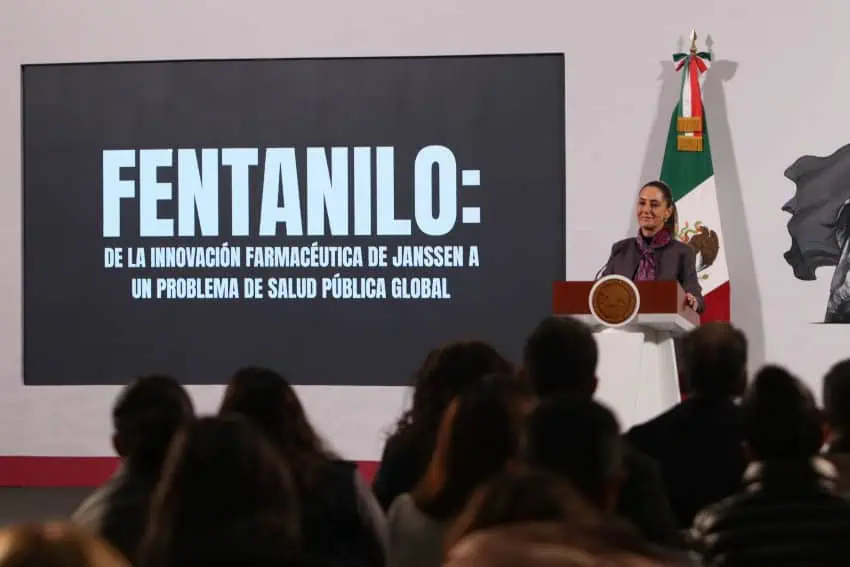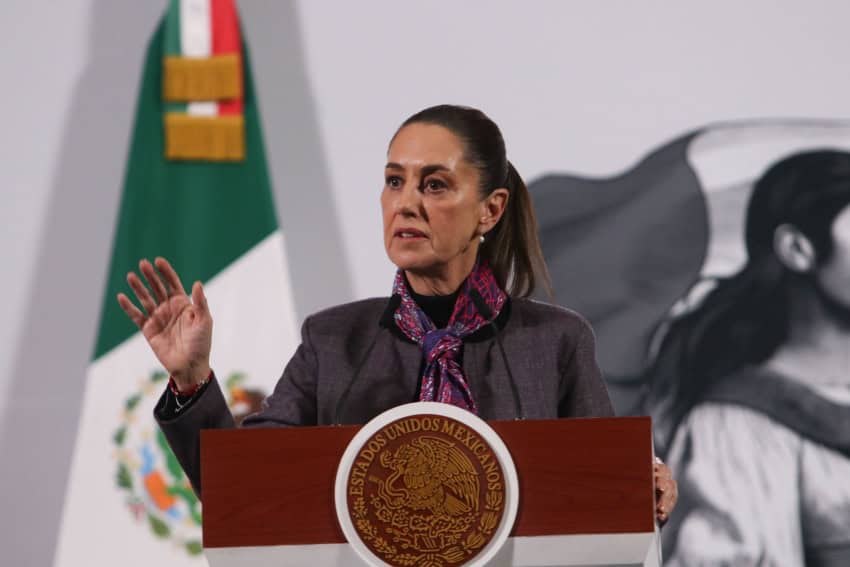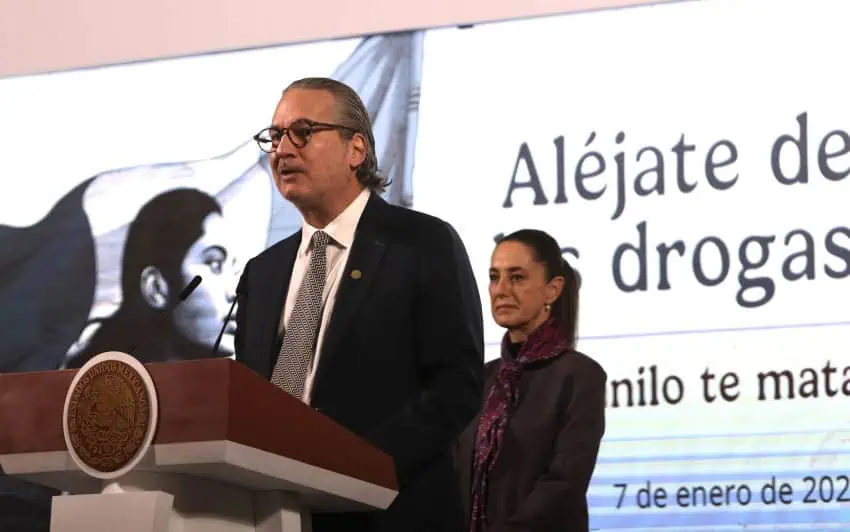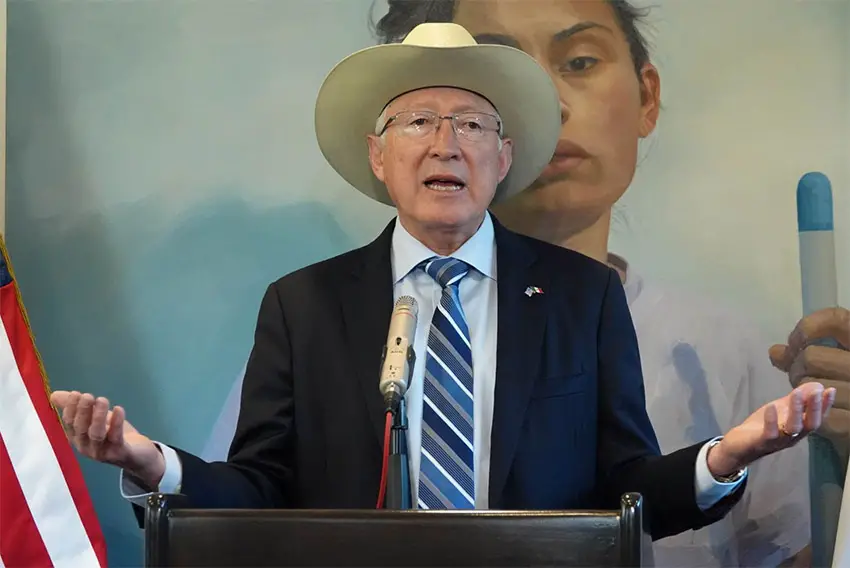No fentanyl crisis in Mexico, says Sheinbaum: Tuesday’s mañanera recapped

President Claudia Sheinbaum was sworn in as Mexico’s first female president 14 weeks ago today and has held a morning press conference, or mañanera, almost every weekday since then. On Thursday, she will complete her 100th full day as president.
On Tuesday, fentanyl production, the political landscape in Canada and Ken Salazar’s (now-completed) tenure as U.S. ambassador to Mexico were among the topics Sheinbaum spoke about at her mañanera.

Sheinbaum: No evidence that ‘the whole process’ of producing fentanyl is completed in Mexico
After federal government officials presented a new anti-fentanyl campaign, Sheinbaum asserted that use of the deadly drug “is not really a problem” in Mexico.
While fentanyl is used in Mexico and there have been deaths linked to the powerful synthetic opioid here, “there is not a crisis like there is in the United States,” she said.
“… We don’t want [the overdose crisis] to reach our country, and that’s why we’re starting this campaign against fentanyl,” Sheinbaum said.
Later in her press conference, the president said that the majority of illicit drug laboratories that have been detected and dismantled in Mexico were producing methamphetamine.
Sheinbaum went on to say that authorities are combating the national distribution of fentanyl as well as the trafficking of the drug into the United States. She cited the recent seizure of more than 500,000 fentanyl pills in Sinaloa as an example of the government’s efforts.


Sheinbaum also said the government is “combatting the illegal production” of fentanyl and other drugs by closely monitoring the chemical precursors that enter the country.
“The possibility of [fentanyl] being made in Mexico or not, and which part [of the drug], is something that is always being investigated in the security cabinet,” she said.
“Up to now, [we have] the fact that precursors arrive, because the majority of the precursors come from Asia,” Sheinbaum said.
“[Evidence] that the whole process [of making fentanyl] is done here in Mexico hasn’t been found,” she said, apparently saying that there is no proof that the precursor chemicals used to make the opioid are manufactured here.
Sheinbaum said that navy officials on Thursday would “explain with more detail” which illicit drugs are made in Mexico and where the precursor chemicals come from.
Her remarks on Tuesday were reminiscent of those made by her predecessor, Andrés Manuel López Obrador, who denied that illicit fentanyl was produced in Mexico, but conceded in 2023 that pills of the powerful opiate are pressed here with ingredients shipped from Asia.
Sheinbaum doesn’t believe a change of government in Canada would affect the USMCA
A reporter noted that Canadian Prime Minister Justin Trudeau announced on Monday that he would resign and referred to polls that show that the leader of the Conservative Party of Canada, Pierre Poilievre, is likely to become prime minister later this year.
Poilievre said in November that he would be willing to negotiate a trade deal with the United States that doesn’t include Mexico.
Sheinbaum said she didn’t believe that the election of Poilievre would lead to “something” happening with the USMCA — i.e. the three-way trade pact’s termination.


“Canada, the United States and Mexico have benefited a lot from the USMCA,” she said.
A federal election will be held in Canada on or before Oct. 20, 2025.
There was a ‘rift’ with outgoing US ambassador, says Sheinbaum
A reporter asked Sheinbaum to “grade” the work in Mexico of Ken Salazar, who completed the final day of his more than three-year term as United States ambassador to Mexico this Tuesday.
“I would say there were disagreements with the ambassador in the final period [of his tenure],” she said.
“One of them was on the issue of the [reform to] the judicial power because he welcomed it one day and condemned it the next. We didn’t know what his position really was,” Sheinbaum said.


“But furthermore, the ambassador of the United States has no reason to offer an opinion on a matter that concerns Mexico,” said the president, who noted that López Obrador put the government’s relationship with the U.S. Embassy “on pause” last year.
Sheinbaum noted that a “problem” with Salazar also arose due to a lack of clarity over the involvement (or otherwise) of the United States in the arrest of alleged Sinaloa Cartel leader Ismael “El Mayo” Zambada in the U.S. last July.
“It was never clear … what the U.S. involvement was,” she said.
“… Yes there was a rift with the ambassador,” Sheinbaum said before declaring that there was no negative impact on the bilateral relations between Mexico and the United States as a result of the differences with Salazar.
United States President-elect Donald Trump announced in December that former U.S. ambassador to El Salvador Ronald Johnson was his pick for ambassador to Mexico during his second term.
By Mexico News Daily chief staff writer Peter Davies ([email protected])
Source: Mexico News Daily

